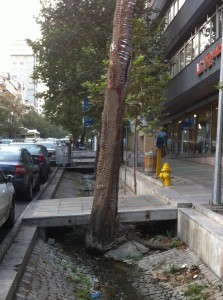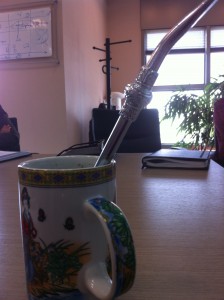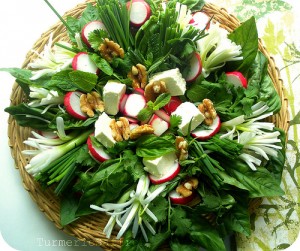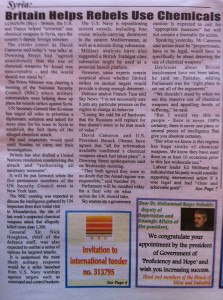Reza (not a name I imagine used extensively today in view of it being that of the deposed Shah) is my driver as we pass a massive new mosque under construction in Teheran. We’d got onto the subject of religion as I’d seen few Iranians observe prayers while at work and asked Reza whether that was usual. He said ‘it’s between me and my god’ adding, that the number of people who regularly attend a mosque is falling. Pressed for a number he says less than a quarter of the population! A figure that shocked me and was contrary to the (erroneous) image I had. All is not as it seems (or is reported) in Iran.
Teheran – a walking city?
The dress code for men is Western (no ties though) and generally women are very smartly turned out.
 People walk or ride interestingly constructed bikes and the feel is European with tree lined boulevards and pavements.
People walk or ride interestingly constructed bikes and the feel is European with tree lined boulevards and pavements.
Traffic is a nightmare and short journies can take hours. It is not uncommon for a 10 mile commute to take 90 minutes. Teheran is a sprawling city with mountains as its backdrop and smog in winter when temperatures can plumment with snow on the hills.
food, drink and cards
Persian cooking is among the best in the world. We were entertained at a villa in the centre of Teheran and treated to the most astonishing meal surrounded by our host’s family.  Another unexpected highlight was being offered Brasilian Mate by our client in his office. The slightly bitter tasting liquid is much prized so this was an honour
Another unexpected highlight was being offered Brasilian Mate by our client in his office. The slightly bitter tasting liquid is much prized so this was an honour .
.
Another treat was to discover how much of the Iranian diet comprises locally sourced food. The impact of sanctions means little is imported and the local goat’s cheese was among the best i’d tasted. Surprinsingly fish is not a Teheran speciality, the absence of a river means fish is farmed though it bore none of the taste associated with UK farmed salmon.
Vegetables are fresh and salads in fashion though fast food is now prevalent and cakes a prerequisite with coffee.
Flowers adorn cards which are given for eid and brithdays.
‘a country united by soccer’
In June Iran, coached by the Portuguese Carlos Queiroz, qualified for the 2014 World Cup finals in Brasil by beating the powerhouse of Asian football South Korea. It was and is a source of great joy and celebration uniting the whole country. And yet unlike Sudan and Saudi Arabia there is no football for the fair sex as women are prohibted from attending matches which I was to discover presents a challenge to be overcome!
Iranian women are nothing if not resourceful and I was reminded of the story of Jeanne Baret reputed to be the first woman to circumnavigate the globe in 1740 dressed as a man! It appears Iranian women adopt a similar tactic to gain access to matches even though the language used by the male attendees is rudimentary.
Although the victory against South Korea was not without controversy (Queiroz was accused of inciting the crowd and making inappropriate gestures) a susbequent traiining camp to Lisboa was cancelled during to lack of funds as reported in Teheran Times.
The Iranian Football Federation (IFF) announced that the training camp which was supposed to be held in Portugal has been cancelled due to lack of funds.
“We tried to arrange the training camp but it’s impossible due to lack of money,” Mehr News Agency quoted head of IFF Ali Kaffashian as saying on Sunday.
Iran was scheduled to face Gabon in its training camp in Lisbon on September 12 as well as a friendly against Sporting Lisbon. Iran football coach Carlos Queiroz told FIFA last week his priority is a good preparation ahead of the 2014 World Cup.
“We have to make a worthy, creditable contribution, one that will honor and make all the supporters in Iran proud. How are we going to do that? With a wide-ranging, intensive preparation, as without that we won’t be able to compete against the big teams,” he said.
I found it astonishing that coach Queiroz’ planned preparation schedule is being disrupted and an illustration of the economic impact of sanctions.
news and social media
As if underscoring the not is all as it seems observation I switch on the TV in the hotel and find BBC World which is a major shock since BBC’s website is blocked along with Facebook and Twitter. Yet Google search is available even if some of its apps are not and during the elections internet line speeds slowed to a crawl.
‘Britain helps rebels use chemicals…’
External news feeds are carefully scrutinised and it is difficult for a theocratically inspired regime news monitor not to be influenced by comments such as ‘nuke the bastards…’ made by a US citizen in the comments section of a online news service in response to an article on the Iranian stance on Syria.
 It goes some (though by no means all the) way to explaining news stories such as this which appeared in Iranian newspapers on our final day in Teheran. Iran’s people are ready for a change and the recent elections seem to have given them hope that a period of isolationism is coming to an end. Not many are aware that Iran’s current President studied at Glasgow University and that so many of its citizen’s prize a good academic career that they are willing to forego luxury items to ensure their family are well educated. Everyone seems to be a Dr. and woe betides the unsuspecting visitor who fails to address someone with a Phd by the correct title.
It goes some (though by no means all the) way to explaining news stories such as this which appeared in Iranian newspapers on our final day in Teheran. Iran’s people are ready for a change and the recent elections seem to have given them hope that a period of isolationism is coming to an end. Not many are aware that Iran’s current President studied at Glasgow University and that so many of its citizen’s prize a good academic career that they are willing to forego luxury items to ensure their family are well educated. Everyone seems to be a Dr. and woe betides the unsuspecting visitor who fails to address someone with a Phd by the correct title.
As we were about to depart, the UK Parliament gave a thumbs down to military intervention in Syria which as all readers will be aware is close both geographically as well as politically. The Iranian news reported this occurance positively!
A recent flurry of messages between London and Tehran and a reopening of diplomatic relations albeit through the Omani embassy in the UK, suggests a change of approach even though on departure I was grilled by the immigration official at Teheran airport about what a UK citizen had been doing there.
More importantly I sense we are at a watershed moment wherein the US is no longer seen as or indeed behaves like the ‘policeman of the world’.
